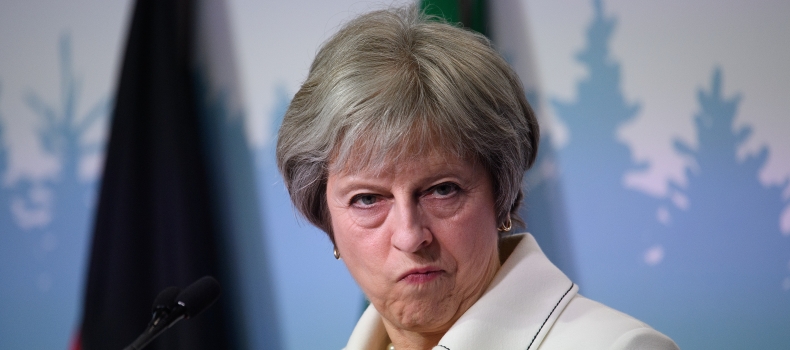London, Feb 22: British Prime Minister Theresa May Friday warned of a new revolt brewing within her otherwise loyal group of party parliamentarians over fears that a chaotic no-deal Brexit is not being ruled out in time for the March 29 deadline for Britain’s exit from the European Union (EU).
The Brexit Delivery Group, which comprises both pro and anti-Brexit Conservative Party MPs, has warned that they are preparing to back alternatives if May’s reworked withdrawal agreement cannot command a House of Commons majority. Co-chairs Andrew Percy and Simon Hart said their group wants the government to take no-deal off the table or they would consider voting against the government and in favour of an amendment to give Parliament the opportunity to delay Brexit and prevent a no-deal situation if there is no agreement with the EU by the middle of March.
“A lot of colleagues are becoming very frustrated, a lot of colleagues have compromised from their positions,” Percy said, adding that the Conservative Party’s hard-Brexiteer group of MPs were refusing to make any compromise.
The European Research Group (ERG) of hard-Brexiteers, led by Tory MPs Jacob Rees-Mogg and Steve Baker, insist the “no-deal” option must be preserved as negotiating leverage in Brussels.
“Not only does this risk damaging the national interest, but also… we are putting in jeopardy the very thing many colleagues have spent decades campaigning for; our exit from the European Union,” the Brexit Delivery Group said in a letter sent to the government’s whips in Parliament. Downing Street said “productive” talks in Brussels aimed at addressing the MPs’ concerns were continuing “urgently”.
The latest threat of revolt comes at the end of a week of continuing party turmoil for the British PM with three high-profile anti-Brexit MPs – Anna Soubry, Heidi Allen and Sarah Wollaston – resigning from the Tory ranks to join a newly-formed Independent Group of MPs by eight Opposition Labour Party defectors.
A number of her Cabinet ministers are also believed to be poised to back a delay to the March 29 Brexit deadline by next week unless there is significant progress on the biggest sticking point in the EU negotiations – a controversial “backstop” clause in the withdrawal agreement which could be triggered to prevent a hard border between EU member-state Ireland and the UK after Brexit.
The Labour Party’s own troubles also continue as a ninth party MP, Ian Austin, resigned Friday blaming party leader Jeremy Corbyn for allowing a culture of “extremism and tolerance” within the ranks. “This is the most difficult decision I’ve ever had to take but I’ve taken it because I’ve become ashamed of the Labour Party,” he said. However, the MP for Dudley North said he had no plans to join the new Independent Group of former Labour and Tory MPs.
Despite the series of exits from her party, May still commands a working majority in Parliament. The combined total for her ruling Conservative party along with Democratic Unionist Party (DUP) support adds up to 324, while the combined total for all other MPs is 318.
However, that parliamentary arithmetic remains precarious with a number of factions unhappy with the government’s Brexit strategy. The UK government is hoping that a so-called “meaningful vote” on Brexit could take place by the end of February if talks with the EU go well. If not, MPs would be given a debate over what should happen in relation to Brexit and would vote on an amendable motion by the middle of next week. A majority of MPs are expected to use that opportunity to try to pass a plan that would force the government to hold a vote on extending Article 50 beyond the March 29 deadline if no deal is in place by mid-March. May is set to travel to an EU-Arab League summit in Sharm el Sheikh at Egypt on Sunday to hold further talks with EU leaders, where she will continue her efforts to win key assurances over the controversial “backstop” clause in an attempt to make the withdrawal agreement more acceptable to all sides of the House of Commons. Meanwhile, a ninth lawmaker quit Britain’s main opposition Labour Party Friday, blaming leader Jeremy Corbyn’s handling of accusations of anti-Semitism within its ranks.
